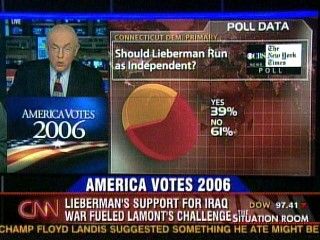Finn d'Abuzz wrote:You Party adherents, thing Soviet Union, think China...
Nonsense.
There is indeed a fundamental difference in perspective between systems where you vote for an individual candidate and his primary loyalty is to himself / his district's constituents, and systems where you vote for a party and its patform.
No democratic country's system is purely one or the other, but there are distinct contrasts. The US leans far toward the former, obviously.
The advantage of that is the direct connection citizens have with "their" Senator or Congressman, and the accountability that comes with that.
The disadvantage - apart from a promotion of clientalism/patronage that results beefed up "pork spending" - is that parties are often "big tents" of all kinds of candidates, and you can get pretty surprised about what you get. There's little in the ways of an official party platform or program, and no clear party leader if the party is in opposition. The result of that is that one's got a point when saying, "I dont know what the Democrats stand for" if only because, well - who represents them? Reid the Senate leader, Pelosi the House leader, Dean the DNC chairman, Hillary the presidential candidate? The same was true for the GOP in the 90s.
In party-based systems, you know exactly what each party stands for. They draft a 'binding' election program and they have a national leader, often elected by a vote amongst its members. You know what each party stands for, so you know that if you vote for that party, thats what any candidate on its list will work for when elected - they've committed to it.
That's far removed, of course, from the silly comparison with the Soviet Union or China, for the obvious enough reason that there, there is/was only ONE party. Citizens of multi-party democracies have the opportunity to vote for any party platform they want, and choose exactly the one that fits best with their personal views and beliefs.
Systems based wholly on individual candidates, like the US, on the other hand, arguably offer less choice to their citizens. With individual candidates elected in districts in winner-takes it all races, where minority votes by definition go lost, these systems are very likely to end up two-party systems, like in the US, or with some luck, like in England, three-party system. (Though it should be noted that in England the pressure to toe the party line is much stronger, and parties have both a clear national leader, a party programme that candidates are expected to follow, and a "Whip" in parliament to make them do so).
With a two-party system like in the US, the voters' choice is restricted to the extremely limited choice between a leftwing party and a rightwing party - or a party slightly left of centre and one slightly right of centre. Thats it. Worse, since you completely depend on whichever candidate runs in your district - if you're in Alabama, you get the choice between a conservative Democrat and a conservative Republican, and in Rhode Island between a liberal Democrat and a liberal Republican. You have the freedom to vote - for variations of the same theme.
Of course, in a party-based, multi-party system, you end up with coalition governments, in which your party's views will also be compromising with others'. But the coalition is created in negotiations between parties - that is, between distinct and defined political platforms - and once the government is created, it is mostly again on the basis of a specific programme that resulted from those negotiations. You know what you get. In the US, on the other hand, majorities that are wrested for this or that controversial vote depend on 'buying off' individual candidates' pet projects or hobby horses - which results in the unsalabrious practice of tacking pork spending items to larger, unrelated policy bills.
There are distinct differences between party-based systems and individual representative-based systems, and although I have argued, in response to your facile Soviet reference, for the democratic values of a party-system, it's clear there are advantages to the alternative too. A Brit can "call his MP" if he has a problem or doesnt like a decision; whom does a Dutchman call? No clue. The bond between citizen and parliamentarian is abstract. On the other hand again, in Holland you can become active in a party and you actually get a vote on individual items in your party's programme, which all your party's candidates are then committed to following. In the US, your right to influence your candidate's vote on any one particular issue depends 100% on whether he chooses to lend you an ear or not. When you vote you simply give that candidate your confidence and hope that he's going to be a good person about it.
Many countries have in-between systems: in Germany, for example, you have two votes - one for your own district's MP, one for the party. There are variations. But your attempt to phrase the difference as a kind of philosophical choice between "true" democracy and dictatorship (the Soviet/China reference) is just weird.
Lieberman?
Jacob Weisberger wrote in SLATE
quote:
The problem for the Democrats is that the anti-Lieberman insurgents go far beyond simply opposing Bush's rationale for the war...Many of them appear not to ake the wider global battle against Islamic fundamentalism seriously. They see Iraq purely as a symptom of a cynical and political right wing response to Sept. 11th as opposed as a tragic misstep in a bigger conflict. POLITICALLY, IT POINTS THE WAY TO PERPETUAL DEMOCRATIC DEFEAT"
end of quote
Friends,
Let the resounding defeat of Senator Joe Lieberman send a cold shiver down the spine of every Democrat who supported the invasion of Iraq and who continues to support, in any way, this senseless, immoral, unwinnable war. Make no mistake about it: We, the majority of Americans, want this war ended -- and we will actively work to defeat each and every one of you who does not support an immediate end to this war.
Nearly every Democrat set to run for president in 2008 is responsible for this war. They voted for it or they supported it. That single, stupid decision has cost us 2,592 American lives and tens of thousands of Iraqi lives. Lieberman and Company made a colossal mistake -- and we are going to make sure they pay for that mistake. Payback time started last night.
I realize that there are those like Kerry and Edwards who have now changed their position and are strongly anti-war. Perhaps that switch will be enough for some to support them. For others, like me -- while I'm glad they've seen the light -- their massive error in judgment is, sadly, proof that they are not fit for the job. They sided with Bush, and for that, they may never enter the promised land.
To Hillary, our first best hope for a woman to become president, I cannot for the life of me figure out why you continue to support Bush and his war. I'm sure someone has advised you that a woman can't be elected unless she proves she can kick ass just as crazy as any man. I'm here to tell you that you will never make it through the Democratic primaries unless you start now by strongly opposing the war. It is your only hope. You and Joe have been Bush's biggest Democratic supporters of the war. Last night's voter revolt took place just a few miles from your home in Chappaqua. Did you hear the noise? Can you read the writing on the wall?
To every Democratic Senator and Congressman who continues to back Bush's War, allow me to inform you that your days in elective office are now numbered. Myself and tens of millions of citizens are going to work hard to actively remove you from any position of power.
If you don't believe us, give Joe a call.
Yours,
Michael Moore
That you are not calling for Lieberman to be jailed does not mean your way of thinking is not dangerous.
and it is a bit bazaar that a man like Lieberman touted as their vice-presidential candidate a few short years ago is now thrown under the bus and left to die a political death, unless he can keep his career alive via the independent ticket.....
As Edgar Blythe pointed out, it's like the kid in the neighborhood who tells the other kids, "I'll play with you as long as I win. As soon as I start to lose, I'm taking my ball and going home."
By Dan Balz
Washington Post Staff Writer
Sunday, August 13, 2006; Page A04
American politics this year has been running on two divergent tracks. The first is intensified partisan combat in advance of a critical midterm election. The second is growing disaffection among many voters with a national capital seen as stalemated by polarization and distrust between the two political parties.
That makes the coming campaign between antiwar Democrat Ned Lamont and Sen. Joseph I. Lieberman, who lost last week's primary and is now running in the general election as an independent, an intriguing laboratory for what might emerge in the 2008 presidential campaign.
Will Lieberman's campaign prove to be a forerunner for a message of civility and bipartisanship that emerges nationally in 2008, or simply be remembered as an obsolete refrain from a politician living in an idealized past and that serves only to deepen partisan divisions?
The Lieberman-Lamont primary became the latest stage for the politics of anger that has dominated since President Bush took office after the disputed election of 2000. Lieberman hopes to make the general election a template for civility in politics and a return to some measure of bipartisan cooperation in Washington.
The war in Iraq and the architecture of Republican electoral victories in 2002 and 2004 have persuaded many strategists in both parties that the key to victory is to maximize support of the most ideological of their followers, rather than appealing to less-partisan swing voters.
Still, long before the Connecticut Senate race, prospective 2008 candidates, including the two early front-runners for their parties' nominations, have been examining the question of whether the public is ready to turn away from the partisan style of politics that has dominated the Bush presidency.
Sen. John McCain (R-Ariz.), despite his recent efforts to make himself more attractive to party conservatives and Bush loyalists, has asked more than once whether voters in 2008 will be looking for a candidate with the attributes he has long exhibited: independence and a willingness to work across party lines.
Sen. Hillary Rodham Clinton (D-N.Y.), a polarizing figure by any measure, nonetheless has spent much of her six years in the Senate developing a record of cooperation with Republican senators that she could take to the voters in 2008, should she decide to run for president.
At the same time, veteran Republican strategist Doug Bailey, Carter administration veterans Hamilton Jordan and Gerald Rafshoon and former independent governor Angus King of Maine, among others, have launched a Web-based organization called Unity08. They are urging Americans turned off by partisan combat to help break the current model by using online voting to nominate a bipartisan ticket next year as an alternative to the two major party nominees....
okie wrote:and it is a bit bazaar that a man like Lieberman touted as their vice-presidential candidate a few short years ago is now thrown under the bus and left to die a political death, unless he can keep his career alive via the independent ticket.....
This is hilarious. Okie, the man who opposes virtually everything the Democratic Party has stood for the past eighty years, is now furious with righteous rage that the Democrats would chooses someone other than Joe Lieberman to represent them in the Senate.
Okie has made clear on these pages he opposes virtually any legislation for workers' rights. He opposed unions. He opposes Franklin Delano Roosevelt and the New Deal. He is so far from what the Democrats have stood for since the 1930's that he needs a hgh power telescope to view the Democratic center.
Obviously, Okie couldn't care less if Joe Lieberman gets hit by a bus or not, so opposed he is to Lieberman's overall policies. Yet here he is going on and on about the outrage of Lieberman losing the primary.
Something is up with the Republicans. Obviously, they really don't care that much about Joe Lieberman, they are disguising something with all this false outrage at what happened to him.
Anybody have any ideas?
August 14, 2006
Thursday's Lessons for Tuesday's Victors
By Michael Barone
Tuesday and Thursday. On Tuesday, anti-Iraq war candidate Ned Lamont beat Sen. Joseph Lieberman in Connecticut's Democratic primary. On Thursday, British authorities arrested more than 20 British Muslims who were plotting to blow up American airliners over the Atlantic Ocean.
Tuesday was a victory for the angry antiwar Left that set the tone in the Democrats' 2003-04 presidential cycle and seems likely to set the tone again in 2007-08. Thursday was a reminder that there are, as George W. Bush has finally taken to calling them, Islamic fascist terrorists who want to kill us and destroy our way of life.
Thursday's lesson was not one Tuesday's victors wanted to learn. Left-wing bloggers played an important part in Lamont's victory. Here's the reaction of one of them, John Aravosis, to the red alert ordered here in response to the British arrests: "Do I sound as if I don't believe this alert? Why, yes, that would be correct. I just don't believe it. Read the article. They say the plot had an 'Al Qaeda footprint.' Ooh, are you scared yet?"
What we are looking at here is cognitive dissonance. The mindset of the Left blogosphere is that there's no real terrorist threat out there. We wouldn't have any serious problem if we'd just do something different -- raise the minimum wage or reduce the number without health insurance (the first issue Lamont mentioned on election night), withdraw from Iraq or (as some Left bloggers suggest) sell out Israel.
As for Lamont, on victory night he mentioned his policy to handle the nuclear threat posed by Iran: We should "bring in allies" and "use carrots as well as sticks." He evidently failed to notice that we deputized Britain, France and Germany to negotiate with Iran for three years and that Iran has been offered plenty of carrots and has not been threatened with many sticks. Once again, a disconnect with reality.
The Iranian mullahs and the Holocaust-denying Mahmoud Ahmadinejad want to destroy Israel and inflict as much damage to the United States as they can. They say so over and over again. They hate our way of life, our freedoms and our tolerance. Unfortunately, there's no obvious and easy way to handle the Iranian regime, just as there was no obvious and easy way to handle Hitler in the late 1930s.
At least Neville Chamberlain was made of sterner stuff. His Tuesday was the Munich agreement in September 1938, when he and the French persuaded Czechoslovakia to give up its borderlands to Hitler. He was cheered by vast crowds eager to avoid the horrors of war. His Thursday came in March 1939, when Nazi troops marched into Prague.
Chamberlain proceeded to build up Britain's military forces and to embark on a vigorous diplomacy to cabin Hitler in. He realized instantly that he had been, as Winston Churchill was to say in his funeral oration in the House of Commons, "deceived by a wicked man." He prepared to call Churchill, his bitter critic on Munich, into government. Chamberlain's diplomacy ultimately failed: Hitler wanted war too much. But Chamberlain stayed true to his countrymen, yielding his place to Churchill and strenuously supporting him when Britain was in peril.
Can we expect as much of our Left? It seems doubtful. Our Left criticized George W. Bush when The New York Times revealed that the National Security Agency was surveilling telephone calls from al-Qaida suspects overseas to the United States. Now it appears that the United States surveilled the British terrorists, and that they made phone calls to the United States. The Left cried foul when The New York Times revealed that the United States was monitoring money transfers at the SWIFT bank clearinghouse in Brussels. Now it appears that there was monitoring of money transfers by the British terrorists in Pakistan. On Tuesday, the Left was gleeful that it was scoring political points against George W. Bush. On Thursday, it seemed that the supposedly controversial NSA surveillance contributed to savings thousands of lives.
Joseph Lieberman is being criticized for saying, "I'm worried that too many people, both in politics and out, don't appreciate the seriousness of the threat to American security and the evil of the enemy that faces us -- more evil, or as evil, as Nazism and probably more dangerous than the Soviet communists we fought during the long Cold War. We cannot deceive ourselves that we live in safety today and the war is over, and it's why we have to stay strong and vigilant."
That view didn't prevail on Tuesday. But it sure made sense on Thursday.
okie wrote:and it is a bit bazaar that a man like Lieberman touted as their vice-presidential candidate a few short years ago is now thrown under the bus and left to die a political death, unless he can keep his career alive via the independent ticket.....
This is hilarious. Okie, the man who opposes virtually everything the Democratic Party has stood for the past eighty years, is now furious with righteous rage that the Democrats would chooses someone other than Joe Lieberman to represent them in the Senate.
Okie has made clear on these pages he opposes virtually any legislation for workers' rights. He opposed unions. He opposes Franklin Delano Roosevelt and the New Deal. He is so far from what the Democrats have stood for since the 1930's that he needs a hgh power telescope to view the Democratic center.
Obviously, Okie couldn't care less if Joe Lieberman gets hit by a bus or not, so opposed he is to Lieberman's overall policies. Yet here he is going on and on about the outrage of Lieberman losing the primary.
Something is up with the Republicans. Obviously, they really don't care that much about Joe Lieberman, they are disguising something with all this false outrage at what happened to him.
Anybody have any ideas?
No, Thomas, it is not the same. Sports is sports-a player who plays well on one team will likely play well for another-it's the same skill set.
[A political party] is supposed to be a group of individuals with shared ideals and vision for the future. That is why one does not normally jump from one party to the other, the way ballplayers jump from one team to the next. The ideals of one party are not the ideals of the other.
Joseph Lieberman clearly thinks it is just fine for the people who lose to him in the primaries should congratulate him and support him in the November election, but when the time comes for him to lose, he is too far above it all to follow suit.
He's taking his ball and going home. And the voters should realize that.
Quote:August 14, 2006
Thursday's Lessons for Tuesday's Victors
By Michael Barone
Tuesday and Thursday. On Tuesday, anti-Iraq war candidate Ned Lamont beat Sen. Joseph Lieberman in Connecticut's Democratic primary. On Thursday, British authorities arrested more than 20 British Muslims who were plotting to blow up American airliners over the Atlantic Ocean.
Tuesday was a victory for the angry antiwar Left that set the tone in the Democrats' 2003-04 presidential cycle and seems likely to set the tone again in 2007-08. Thursday was a reminder that there are, as George W. Bush has finally taken to calling them, Islamic fascist terrorists who want to kill us and destroy our way of life.
Thursday's lesson was not one Tuesday's victors wanted to learn. Left-wing bloggers played an important part in Lamont's victory. Here's the reaction of one of them, John Aravosis, to the red alert ordered here in response to the British arrests: "Do I sound as if I don't believe this alert? Why, yes, that would be correct. I just don't believe it. Read the article. They say the plot had an 'Al Qaeda footprint.' Ooh, are you scared yet?"
What we are looking at here is cognitive dissonance. The mindset of the Left blogosphere is that there's no real terrorist threat out there. We wouldn't have any serious problem if we'd just do something different -- raise the minimum wage or reduce the number without health insurance (the first issue Lamont mentioned on election night), withdraw from Iraq or (as some Left bloggers suggest) sell out Israel.
As for Lamont, on victory night he mentioned his policy to handle the nuclear threat posed by Iran: We should "bring in allies" and "use carrots as well as sticks." He evidently failed to notice that we deputized Britain, France and Germany to negotiate with Iran for three years and that Iran has been offered plenty of carrots and has not been threatened with many sticks. Once again, a disconnect with reality.
The Iranian mullahs and the Holocaust-denying Mahmoud Ahmadinejad want to destroy Israel and inflict as much damage to the United States as they can. They say so over and over again. They hate our way of life, our freedoms and our tolerance. Unfortunately, there's no obvious and easy way to handle the Iranian regime, just as there was no obvious and easy way to handle Hitler in the late 1930s.
At least Neville Chamberlain was made of sterner stuff. His Tuesday was the Munich agreement in September 1938, when he and the French persuaded Czechoslovakia to give up its borderlands to Hitler. He was cheered by vast crowds eager to avoid the horrors of war. His Thursday came in March 1939, when Nazi troops marched into Prague.
Chamberlain proceeded to build up Britain's military forces and to embark on a vigorous diplomacy to cabin Hitler in. He realized instantly that he had been, as Winston Churchill was to say in his funeral oration in the House of Commons, "deceived by a wicked man." He prepared to call Churchill, his bitter critic on Munich, into government. Chamberlain's diplomacy ultimately failed: Hitler wanted war too much. But Chamberlain stayed true to his countrymen, yielding his place to Churchill and strenuously supporting him when Britain was in peril.
Can we expect as much of our Left? It seems doubtful. Our Left criticized George W. Bush when The New York Times revealed that the National Security Agency was surveilling telephone calls from al-Qaida suspects overseas to the United States. Now it appears that the United States surveilled the British terrorists, and that they made phone calls to the United States. The Left cried foul when The New York Times revealed that the United States was monitoring money transfers at the SWIFT bank clearinghouse in Brussels. Now it appears that there was monitoring of money transfers by the British terrorists in Pakistan. On Tuesday, the Left was gleeful that it was scoring political points against George W. Bush. On Thursday, it seemed that the supposedly controversial NSA surveillance contributed to savings thousands of lives.
Joseph Lieberman is being criticized for saying, "I'm worried that too many people, both in politics and out, don't appreciate the seriousness of the threat to American security and the evil of the enemy that faces us -- more evil, or as evil, as Nazism and probably more dangerous than the Soviet communists we fought during the long Cold War. We cannot deceive ourselves that we live in safety today and the war is over, and it's why we have to stay strong and vigilant."
That view didn't prevail on Tuesday. But it sure made sense on Thursday.
The populism of Ned Lamont and the netroots runs only skin deep.
Unfortunately for Democrats, libertarianism--even the kinder, gentler, Democratic variant Moulitsas proposes--would be a political disaster. Democrats still need the white working class to help them win elections. And, as the party has become more socially liberal over the last 15-20 years, the only thing that has kept those voters from deserting the party entirely has been the sense that Democrats are still better on economics. Take away that and you've got a party that only appeals to affluent social liberals, which does not a majority make. On the other hand, it should win you a lot of elections in Fairfield County, Connecticut.
http://www.tnr.com/doc.mhtml?i=w060814&s=scheiber081406
I've only pasted the last paragraph of this article on the "netroots" movement, but the rest of the article is equally interesting, indicative of just how hypocritical Ned and his so-called movement are.
Quote:The populism of Ned Lamont and the netroots runs only skin deep.
Unfortunately for Democrats, libertarianism--even the kinder, gentler, Democratic variant Moulitsas proposes--would be a political disaster. Democrats still need the white working class to help them win elections. And, as the party has become more socially liberal over the last 15-20 years, the only thing that has kept those voters from deserting the party entirely has been the sense that Democrats are still better on economics. Take away that and you've got a party that only appeals to affluent social liberals, which does not a majority make. On the other hand, it should win you a lot of elections in Fairfield County, Connecticut.
http://www.tnr.com/doc.mhtml?i=w060814&s=scheiber081406





